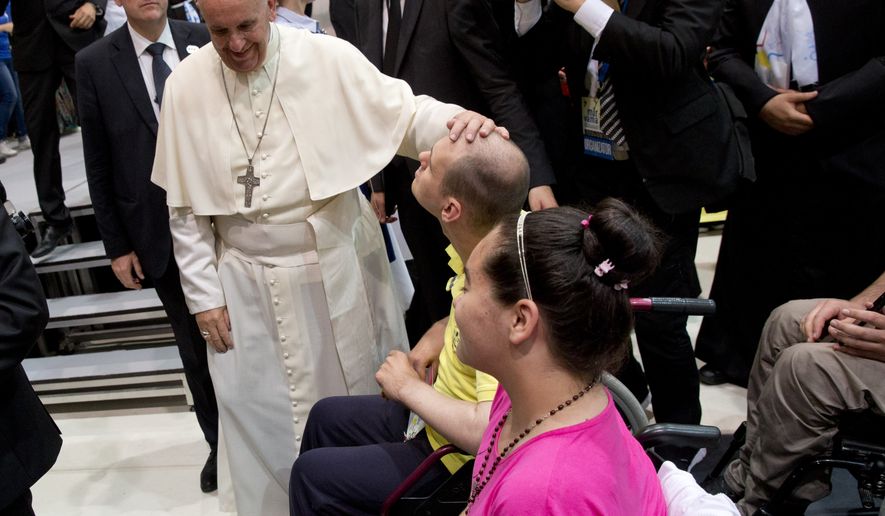Sarajevo, Bosnia and Herzegovina - During his daytrip to a country still marred by the effects of a recent war, Pope Francis said peace is not something that happens passively, but instead requires passionate action on the part of all.
“(Jesus) does not say: ‘Blessed are the preachers of peace,’ since all are capable of proclaiming peace, even in a hypocritical, or indeed duplicitous, manner. No. He says: ‘Blessed are the peacemakers,’ that is, those who make peace,” the Pope said.
To craft peace, he said, “is a skilled work: it requires passion, patience, experience and tenacity.”
Pope Francis’ comments came during his homily for Mass in Sarajevo’s Kosevo Stadium. His June 6 daytrip to Sarajevo, the capital of Bosnia-Herzegovina, falls two decades after a brutal conflict scarred the country.
Twenty years ago in 1995 the signing of the Dayton Agreement ended the Bosnian War for Independence.
After the breakup of Yugoslavia, the war killed around 100,000 combatants and civilians and displaced a million more people. The fighting split largely along ethnic lines, among the predominantly Orthodox Serbs, the predominantly Catholic Croats, and the predominantly Muslim Bosniaks.
In his homily, delivered in Italian, the Pope stressed that peace is God’s desire for all of humanity, and is something which ultimately stems from our reconciliation with him.
“Peace is God’s dream, his plan for humanity, for history, for all creation,” Francis told a congregation of some 60 thousand people. However, this plan “always meets opposition from men and from the evil one.”
God’s gift of peace to us “is the fruit of his reconciliation with us,” he said, reflecting on St. Paul’s words. “Only if we allow ourselves to be reconciled with God can human beings become artisans of peace.”
“Even in our time, the desire for peace and the commitment to build peace collide against the reality of many armed conflicts presently affecting our world,” the Pope said.
“They are a kind of third world war being fought piecemeal and, in the context of global communications, we sense an atmosphere of war.”
Pope Francis continued, saying that war is more than just a conflict between cultures and societies.
War, he said, “means children, women and the elderly in refugee camps; it means forced displacement of peoples; it means destroyed houses, streets and factories; it means, above all, countless shattered lives.”
He reflected the suffering and destruction brought about by the conflict experienced in Sarajevo two decades earlier.
“Today, dear brothers and sisters, the cry of God’s people goes up once again from this city, the cry of all men and women of goodwill: war never again!”
Jesus’ words “Blessed are the peacemakers” comprise an appeal applicable to every generation, the Pope said.
Those who make peace do so “by their daily actions, their attitudes and acts of kindness, of fraternity, of dialogue, of mercy,” Francis continued, explaining that God always sows peace in the world, and did so specifically through his Son, who died “that we might have peace!”
“Peacemaking is a work to be carried forward each day, step by step, without ever growing tired,” he added, and explored the question of how peace is built.
Ultimately “peace is a work of justice,” he said, explaining that this isn’t something passively imagined or spoken about either, but is rather “a justice put into practice, lived out.”
The Pope turned to Jesus’ words in the Gospel, “You shall love your neighbor as yourself,” noting that this includes our enemies.
“When, by the grace of God, we truly follow this commandment, how things change! Because we ourselves change!” he said.
“True justice, then, is doing to others what I would want them to do to me, to my people.”
Pope Francis focused on the day’s second reading which speaks about the attitude we need to make peace: “compassion, kindness, lowliness, meekness and patience, forbearing one another and, if one has a complaint against another, forgiving each other; as the Lord has forgiven you, so you also must forgive.”
He warned against believing that peace depends solely on ourselves, and thereby falling into “an illusive moralizing.”
“Peace is a gift from God, not in the magical sense, but because with his Spirit he can imprint these attitudes in our hearts and in our flesh, and can make us true instruments of his peace.”
Pope Francis’ visit to the region also falls 18 years after Saint John Paul II visited in 1997, just two years after the signing of the Dayton Agreement that ended the war.
Before celebrating Mass Francis met with Sarajevo’s authorities, speaking to them about the significance of Bosnia and Herzegovina in Europe. He lauded the advancements toward peace which have been made in the past 20 years, yet added that more work still needs to be done.
“I have come here as a pilgrim of peace and dialogue,” the Pope told the authorities.
“We need to communicate with each other, to discover the gifts of each person, to promote that which unites us, and to regard our differences as an opportunity to grow in mutual respect,” he said.
With this dialogue, “even the deep wounds of the recent past will be set aside, so that the future may be looked to with hope, facing the daily problems that all communities experience with hearts and minds free of fear and resentment.”




Please read our comment policy before commenting.